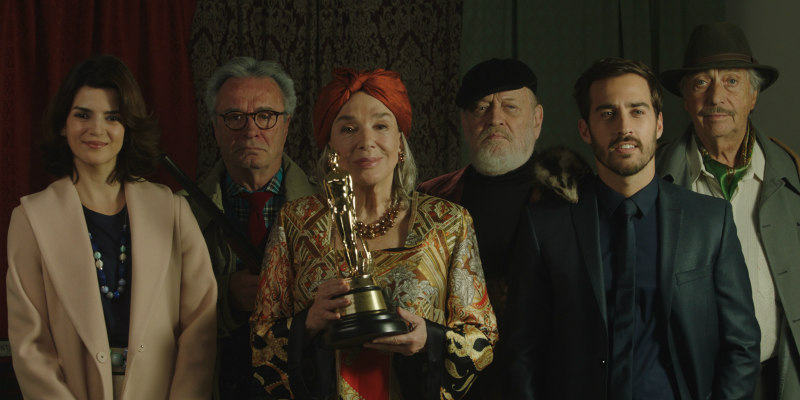
Review by
Benjamin Poole
Directed by: Juan José Campanella
Starring: Graciela Borges, Oscar Martínez, Luis Brandoni, Marcos Mundstock, Clara
Lago, Nicolás Francella

Getting older, becoming ‘old’, is defined by a slow and inevitable process
of loss: looks, opportunities, health, friends, and eventually,
inexorably, your very life itself; all falling down the back of time’s
sofa piece by irretrievable piece, regardless of how tightly we attempt to
hold on to what we have previously taken for granted.
‘There is no better lesson than pain and suffering’, the ancient tagline
to one of Mara Ordaz’s (Graciela Borges) B-movies advises in
Juan José Campanella’s The Weasel’s Tale. Once the toast of Hollywood, Mara is now in her winter years,
surrounded in her dilapidated mansion with the yellowing artefacts of her
glory years: old posters, moth-eaten props and fragile newspaper
clippings. It’s not that the pictures got small either, more the
inconvenient truth that time is bigger than us all. Perhaps this is why
Mara squirrels herself away in the confined spaces of her down-at-heel
pile, re-watching her old movies from when she was young and anything
seemed possible, before the walls closed in.

At least Mara isn’t alone in her dotage. Her oppos include husband and ex
co-star Pedro (Luis Brandoni), director Norberto (Oscar Martínez) and screenwriter Martín (Marcos Mundstock). And, suddenly one
day, two hot twenty-somethings from the city, who apparently happen upon
the mansion while lost in the Argentinian outskirts, and who thrill Mara
by recognising her and buffing up her faded celebrity image. Flattery will
get you everywhere, and before you can say the stars are ageless, these
two chancers have all but convinced Mara to sell her insalubrious little
grief hole, much to the chagrin of her housemates who resolve to retain
the house at whatever cost.
What follows is an Argentinian take on the gentle but none more black
comedies of Ealing Studios (The Weasel’s Tale is in fact
based on the 1976 film - slightly spoilerific title if you speak Espanola
- Los Muchachos de antes no Usaban Arsénico), but, with its sardonic pace and emphasis on character interaction, is
more of a hang-out piece than the tight energy of, say,
The Ladykillers.

The problem with The Weasel’s Tale is that hanging out with
this lot, with their unspoken jealousies and simmering insecurities, and
the manipulation at the hands of Bárbara (Clara Lago) and Francisco
(Nicolás Francella), does get a bit wearing. They don’t even seem
to get on with each other, so there is little reason for us to like them
either!
The pacing is as indulgent, however, as the gorgeous set design and thick
colours that make up the cinematography, constituting the gingerbread
gothic of the mansion and setting the stage for the final act’s ruthless
machinations, wherein the comedy is as sharp as the characters are
unforgiving. Your attention my have wavered by then though, and that’s on
Campanella’s liberal approach to sequencing.

Perhaps all is not lost in old age, though. The chancers from the city,
with their limited aspirations towards wealth and status, give our gang
something to kick back against, and a final chance to exercise their
artistic skills of performance, staging and (mis)direction. Qualities
which The Weasel’s Tale itself has in spades but, like the
characters it so deftly portrays, takes almost too long to fully lean into
them.

The Weasel's Tale is in US cinemas
and virtual screenings from December 11th. A UK/ROI release has yet to be
announced.

